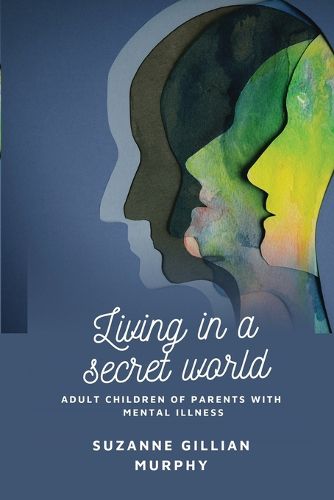Readings Newsletter
Become a Readings Member to make your shopping experience even easier.
Sign in or sign up for free!
You’re not far away from qualifying for FREE standard shipping within Australia
You’ve qualified for FREE standard shipping within Australia
The cart is loading…






This title is printed to order. This book may have been self-published. If so, we cannot guarantee the quality of the content. In the main most books will have gone through the editing process however some may not. We therefore suggest that you be aware of this before ordering this book. If in doubt check either the author or publisher’s details as we are unable to accept any returns unless they are faulty. Please contact us if you have any questions.
There has been a growing international discourse regarding the experiences and needs of
children living with a parent with mental illness. However, there remains a paucity of
research and dialogue surrounding the experiences of adult children who have lived with
childhood parental mental illness. The limited available research which considered adult
children highlighted increased risks of anxiety, depression, suicide, and limited
psychosocial functioning. Furthermore there is a limited discourse surrounding the adult
child's own parenting role. Qualitative research which invites adult children to construct
their parenting narratives, (being parented and their own current parenting role) is
unique.
Methodology
A social constructionist philosophy was adopted to underpin the study. A Partnership
Framework for a Reflexive Narrative for Researcher and Participant was generated
specially for this study. Participants were invited to meet with the researcher if they had
experienced childhood parenting by a parent with a diagnosed mental illness and if they
themselves, had not been diagnosed or treated for mental illness. During a metaphorical
research space, the researcher met with individual participants to work in partnership to
construct their narrative of being parented, alongside their own parenting role. A multistaged
thematic analysis process was used thereafter. In addition, a chronological
mapping of participant's experiences highlighted important themes from childhood, the
teenager period, adulthood, and subsequent adult children's parenting journeys.
$9.00 standard shipping within Australia
FREE standard shipping within Australia for orders over $100.00
Express & International shipping calculated at checkout
This title is printed to order. This book may have been self-published. If so, we cannot guarantee the quality of the content. In the main most books will have gone through the editing process however some may not. We therefore suggest that you be aware of this before ordering this book. If in doubt check either the author or publisher’s details as we are unable to accept any returns unless they are faulty. Please contact us if you have any questions.
There has been a growing international discourse regarding the experiences and needs of
children living with a parent with mental illness. However, there remains a paucity of
research and dialogue surrounding the experiences of adult children who have lived with
childhood parental mental illness. The limited available research which considered adult
children highlighted increased risks of anxiety, depression, suicide, and limited
psychosocial functioning. Furthermore there is a limited discourse surrounding the adult
child's own parenting role. Qualitative research which invites adult children to construct
their parenting narratives, (being parented and their own current parenting role) is
unique.
Methodology
A social constructionist philosophy was adopted to underpin the study. A Partnership
Framework for a Reflexive Narrative for Researcher and Participant was generated
specially for this study. Participants were invited to meet with the researcher if they had
experienced childhood parenting by a parent with a diagnosed mental illness and if they
themselves, had not been diagnosed or treated for mental illness. During a metaphorical
research space, the researcher met with individual participants to work in partnership to
construct their narrative of being parented, alongside their own parenting role. A multistaged
thematic analysis process was used thereafter. In addition, a chronological
mapping of participant's experiences highlighted important themes from childhood, the
teenager period, adulthood, and subsequent adult children's parenting journeys.